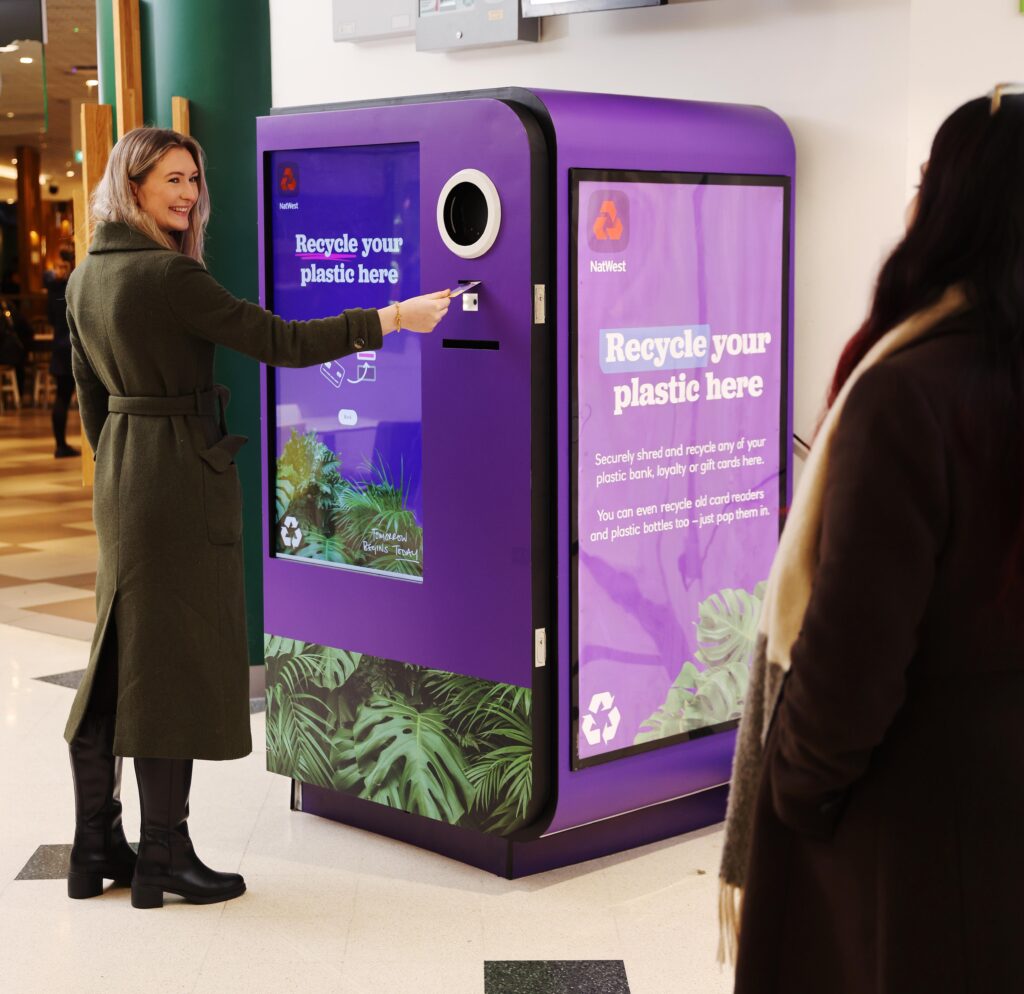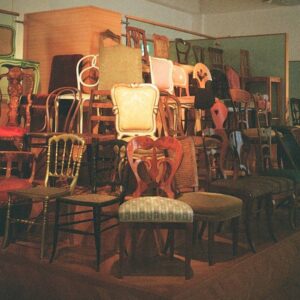NATWEST LAUNCHES PIONEERING REVERSE VENDING MACHINES TO HELP LONDONERS REDUCE PLASTIC CARD POLLUTION

### Strictly Embargoed Until 00:01 on 02/02/2023 ### *** FREE FOR EDITORIAL USE *** Londoners can now recycle their plastic debit and credit cards securely and in an eco-friendly way as part of NatWest's first-of-its-kind 'Reverse Vending Machines'. The first machine has been installed at Victoria Place Shopping Centre food terrace above Victoria Station, to reduce plastic pollution due to payment cards.
The latest research from NatWest reveals a lack of recycling options for plastic payment, gift and loyalty cards has created over
380 tonnes of plastic card waste since 2017, equivalent to 172 London black cabs.
NatWest has today launched first-of-its-kind ‘Reverse Vending Machines’ offering a secure, eco-friendly way to recycle old and unused plastic cards
of which there are 65 million gathering dust in peoples’ homes, or sat idly in their wallets and bags. The new machine will also accept card readers and plastic bottles for recycling.
In their new London
locations, the Reverse Vending Machines are free to use for everybody, regardless of whether they are a NatWest customer.
The design, manufacture and trial of the bespoke Reverse Vending Machines began in the wake of COP26 and are now launching to the public, available
initially in London, one of the UK’s plastic pollution hubs. The first machines will be situated at Victoria Place and Canary Wharf Shopping Centres, offering easy access to shoppers and commuters. Two machines will also be placed in Guys and St Thomas’ Hospitals,
in partnership with the NHS.
This follows trials last year at NatWest’s Edinburgh and London offices, where over 35,000 cards and 2,000 bottles gathered from testing sites have
already been recycled into over 3,000 hats and pairs of socks. Over 400 of these garments were donated to Social Bite in December as part of their ‘Festival of Kindness’ for homeless and vulnerable communities in London.
The pilot launch builds on the recent introduction of NatWest’s environmentally friendly debit and credit cards made of 86% recycled
material – a move expected to save over 50 tonnes of PVC plastic.
The research from NatWest also found that:
·
62%
of consumers have unused payment, gift and loyalty cards lying around at home
·
Over
6.6 million people wrongly assume that plastic cards are recyclable via traditional methods.
·
More than
76 million payment, loyalty and gift cards (380 tonnes of plastic) have ended up in UK landfills by default in the last five years
·
Confusion whether or not you could recycle plastic cards has led to the contamination of an estimated
10.2 million batches of recycling, due to well-intentioned consumers throwing their cards into recycling bins
·
With
68% of people citing personal security as a main concern when binning their old payment cards, the practice of cutting them up and scattering the pieces across various bins to avoid fraud only exacerbates the problem, contaminating several batches of
recycling at one time.
London: A plastic pollution hub
London was identified as one of the UK’s main epicentres of plastic card pollution, with well over half of residents (64%) admitting to having
unused plastic cards lying around in their homes. Londoners were also more unsure than the rest of England around whether they could recycle their cards –
49% of Londoners incorrectly assume that their credit or debit card is best-placed in a recycling bin.
Alison Rose, CEO at NatWest Group said:
“Recycling our plastic cards and card readers are just two simple ways to make a positive impact on plastic pollution in the UK.
But we know that the recycling guidance can be unclear for customers due to the security concerns of council-run recycling pick-ups. That’s why we
are tackling this issue head-on by piloting our Reverse Vending Machines near London’s busiest transport hubs and largest hospitals and introducing sustainable credit and debit cards to all our customers.
I urge local commuters, shoppers and passers-by from across London to search their homes for expired plastic cards, and join us in shifting the dial
on plastic pollution in the UK’s capital city.”
About the Reverse Vending Machines
NatWest’s Reverse Vending Machines have been launched in partnership with leading sustainability brand Reborn. As the world’s first banking machines
launched in designed to ‘eat’ users’ payment plastic items deliberately, with 68% of people citing personal security as a main concern when binning their old payment cards, the purpose-built unit recycles plastic cards
and card readers in a fraud-secure and sustainable process, reflective of NatWest’s growing focus on the circular economy.
Each card is shredded to wipe consumers’ details from the item, before the pieces are securely stored, only accessible by a designated driver. After
pickup, the waste makes its way to a recycling plant via an electric vehicle to become something new. The first batches from the pilot phase of NatWest’s Reverse Vending Machine rollout are being repurposed into hats and socks for London’s homeless population.
Using integrated blockchain technology which links to a purpose-built dashboard, it is possible to track what the plastic from each machine has been
made into and the carbon and energy saved as a result.
Founder of Reborn, Zak Johnson, said,
“As plastic pollution continues to grow around the world it is now more important than ever to adjust our behaviour as humans and find better ways of recycling. The first step in most recycling is us, the consumer, so our mission has been to make recycling
as simple and as easy as possible, placing Reverse Vending Machines in places you’re likely to pass to encourage use. We’re so excited to be embarking on this journey with NatWest and can’t wait to turn consumers’ plastic cards, card readers and bottles into
reusable materials and even clothing.”
The launch of the Reverse Vending Machines marks the latest addition to NatWest’s growing sustainability manifesto, including newly launched environmentally-friendly
debit and credit cards made from 86% recycled materials, in-app carbon footprint tracking for consumers to help visualise the emissions generated by shopping decisions, staff uniforms made from sustainable fabrics and recycled plastics and an ongoing partnership
with The Conservation Volunteers Group to plant 130,000 trees in 2022.




